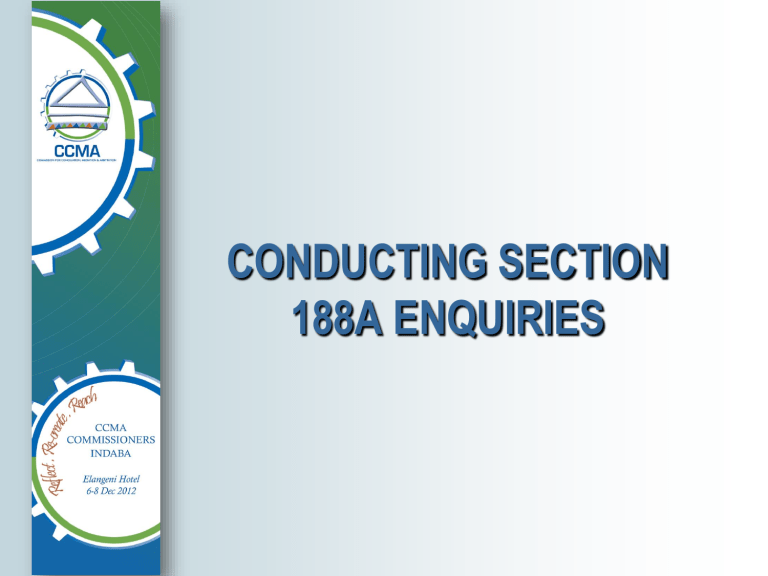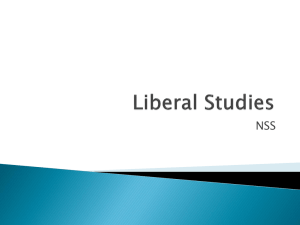Conducting an enquiry by arbitrator (Pre-dismissal arbitration)

CONDUCTING SECTION
188A ENQUIRIES
Introduction
The proposed amendments to section 188A of the Labour
Relations Act may result in increased usage of the predismissal arbitration.
This may require the CCMA to capacitate more
Commissioners to conduct these processes.
The purpose of the workshop is to give Commissioners an overall understanding of section 188A (including the proposed amendments) and to propose a best practice approach to conducting the process.
PURPOSE OF AMENDMENTS
• to facilitate the use of CCMA commissioners to conduct disciplinary enquiries.
• to promote enquiries by arbitrators, which avoid the need to have both an enquiry and an arbitration hearing, by allowing their introduction through collective agreement.
• to avoid disputes where an employee claims that the holding of an enquiry into allegations of misconduct, and suspension pending such an enquiry, breaches the provisions of the Protected Disclosures Act by permitting either party to insist on an enquiry under this section.
RENAMING THE PROCESS
1.
Presently the process is known as “pre-dismissal arbitration”.
2.
The title is unfortunate because it seems to assume that the outcome of the process will be dismissal ( SATAWU and
others v MSC Depots (Pty ) Ltd. para [11]).
3.
Should the bill be passed the process will be known as
“enquiry by arbitrator”.
4.
The new name will reduce the suspicion with which the process is presently viewed by employees and will lead to increased usage of the process.
AGREEMENT TO ENQUIRY
1.
Employees earning R172 000 p.a. or less - must give specific consent by signing the request.
2.
Employees earning more than R172 000 p.a. - may agree to enquiry in contract of employment.
3.
Employer may request enquiry in accordance with a collective agreement.
WHEN AGREEMENT NOT REQUIRED
WHEN EMPLOYEE MAY REQUIRE ENQUIRY
Proposed new section 188A (11)
Despite subsection 1, if an employee alleges in good faith that the holding of an enquiry contravenes the Protected Disclosures Act, 2000
(Act No. 26 of 2000), that employee or the employer may require that an enquiry be conducted in terms of this section into allegations by the employer into the conduct or capacity of the employee.
PROPOSED INDEMNITY
1. If an employee is dismissed in contravention of the
Protected Disclosures Act, 2000 on account of having made a protected disclosure as defined in the Act, then the dismissal is automatically unfair.
2 An unfair act or omission involving an occupational detriment, other than dismissal, in contravention of the
PDA on account of the employee having made a protected disclosure, is an unfair labour practice.
3 Proposed new section 188A (12) - “The holding of an enquiry by an arbitrator in terms of this section and the suspension of an employee on full pay pending the outcome of such an enquiry do not constitute an occupational detriment, as contemplated by the Protected
Disclosures Act, 2000 (Act No. 26 of 2000).”
PURPOSE OF SECTION 188A
SATAWU and others v MSC Depots (Pty) Ltd
The section is “a means of expediting dispute resolution by avoiding duplication between internal and external hearings.”
“Section 188A holds the promise of the expeditious resolution of disputes about employee conduct and the swift imposition of a fair sanction for any proven misconduct.”
EFFECT OF AGREEMENT
SATAWU and others v MSC Depots (Pty) Ltd
“…the employer effectively agrees to bypass the application of its internal disciplinary procedures and to accelerate the disciplinary process to the stage of the arbitration hearing ordinarily applicable in a postdismissal phase.”
“In effect, in terms of a tripartite agreement between the employee, the employer and the
CCMA, an arbitrator steps into the shoes of the employer and assumes the right normally considered a sacrosanct element of the managerial prerogative - the right to exercise discipline, including the right to dismiss.
”
CONSENT MAY NOT BE WITHDRAWN
SATAWU and others v MSC Depots (Pty ) Ltd
The material parts of the system of compulsory arbitration that is established by Part C of chapter VII of the Act, are specifically made applicable to an arbitration hearing in terms of section 188A.
…from the wording of s 188A that once an employer and an employee consent to refer the determination of allegations of misconduct or incapacity to an arbitration hearing in terms of s
188A, and once the CCMA accedes to the request, the employer effectively agrees to bypass the application of its internal disciplinary procedures and to accelerate the disciplinary process to the stage of the arbitration hearing ordinarily applicable in a post-dismissal phase. That being so, and since the consent of the affected employee and the CCMA is necessary to achieve that result, it is not open to the employer to abandon the process on a unilateral basis.”
QUESTIONS
Does the section envisage a “tripartite agreement”?
Is the consent of the CCMA required?
If all the statutory requirements were met, is the CCMA not obliged to conduct the enquiry?
Under the new section, if the request is made in terms of an open ended collective agreement, terminable on reasonable notice, until when may it be withdrawn?
May the CCMA conduct a section 188A enquiry if the parties involved are parties to a bargaining council? Do such parties have a choice between the bargaining council and the CCMA?
May the employer unilaterally decide to withdraw the disciplinary action once and for all?
RIGHT OF REPRESENTATION IF BILL IS PASSED
•
•
•
•
Party may be represented only by co-employee; director or employee, if the party is a juristic person; any office bearer or official of that party’ registered trade union or registered employers’ organisation; legal practitioner, on agreement between the parties or if permitted by the arbitrator in accordance with the rules regulating representation at an arbitration before the Commission.
NOTE: If bill is passed a party may no longer be represented by a member of that party’ registered trade union or registered employers’ organisation. Arbitrator permitting legal representation will be new.
May an employer who is not a juristic person be represented by an employee?
What if parties agree legal representation may not be allowed and one of them later applies for it to be allowed?
POWERS OF ARBITRATOR
• Powers conferred in terms of section 142 (1) (a) to (e) and
(7) to (9)
• May decide on appropriate form of the proceedings but must alllow a party to give evidence, call witnesses, question the witnesses of the other party and address concluding arguments.
• An arbitrator conducting an enquiry in terms of this section must, in the light of the evidence presented and by reference to the criteria of fairness in this Act, rule as to what action, if any, may be taken against the employee.
• The ruling of the arbitrator in an enquiry has the same status as an arbitration award and the provisions of sections 143 to 146 apply with the changes required by the context to any such ruling .
BEST PRACTICE
• Consult parties and seek agreement on procedure. If possible follow same procedure as internal procedure.
Avoid criminal justice model.
• Deal with matter as soon as possible.
• Ascertain that employee party was afforded all rights.
• Unless otherwise agreed follow two stage process in event of finding that misconduct was committed.
Separate hearing on sanction.
• Have regard to internal disciplinary code and procedure or applicable collective agreement when deciding on the existence of rule and/or the sanction that may be imposed.
• Where appropriate authorise employer to impose sanction.
ADVANTAGES
• Expeditious resolution of disputes about employee conduct or incapacity
• Elimination of duplication with significant costs savings
• Final and binding decision by impartial arbitrator with expertise subject only to review
DISADVANTAGES
• Relinquish employer prerogative
• Possible delays prolonging paid suspension
• Unknown third party arbitrator that may possibly not have the required expertise
• May not revert to internal procedures








